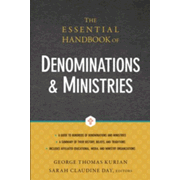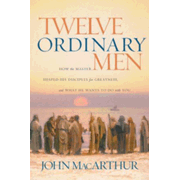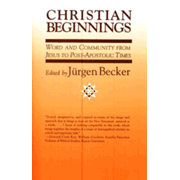FOR PALM SUNDAY this year, many Lutheran congregations hear initially from the Gospel According to Saint John. This is done within the context of the Procession of the Palms. Words of scripture are read during the first worship moments, wherein we of the Church note a graceful occasion in the ministry of Jesus. During the annual event, as well, we do a work termed as the “Blessing of the Palms”. That blessing is followed in the remaining service by the later full reading of the Passion of Our Lord. That later text from another gospel becomes central to our worship experience, for it describes the fullness our Lord’s passion for our salvation. However, today for the sake of setting the stage for these holy observances, we concentrate on the words of blessed John. The gospel reads. . .
The
next day a great crowd who had come to the feast heard that Jesus was coming to
Jerusalem. So they took branches of palm trees and went out to meet him,
crying, “Hosanna! Blessed is he who comes in the name of the Lord, even the
King of Israel!”
And Jesus found a young donkey and sat upon
it; as it is written, “Fear not, daughter of Zion; behold, your king is coming,
sitting on a donkey’s colt!”.
His disciples did not understand this at
first; but when Jesus was glorified, then they remembered that this had been
written of him and had been done to him.
The crowd that had been with him when he
called Lazarus out of the tomb and raised him from the dead bore witness. The
reason why the crowd went to meet him was that they heard he had done this
sign.
The Pharisees then said to one another, “You
see that you can do nothing; look, the world has gone after him.” (John
12:12-19)
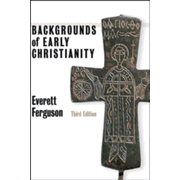 |
Backgrounds of Early Christianity, Third Edition By Everett Ferguson |
The
New King?
From the last decade of the first
century, the final form of the Gospel of John related the entry of Jesus into
Jerusalem for the “Feast of the Passover”. The feast commemorated the sacrifice
of an unblemished lamb killed for each household that hid behind
closed doors when the wrath of God lay judgment upon Egypt. Historically, the
blood of the lamb had been placed above the doorway of each enslaved family, so that
God would “pass over” them and the plague would not harm them.
As Jesus went toward Jerusalem for that year’s
Passover celebration, he was walking toward the gate of the city and a crowd met
him. They swept him up with them and began a joyous parade, treating him as he
was a conquering hero or victorious monarch (see 1 Maccabees 13:51). The throng
thus welcomed him as they would a returning “King of the Jews”. According to the gospel writer, this sweeping
event occurred as response to his raising of Lazarus from the dead.
This very scene is also presented elsewhere in scripture (Mark 11:1-11, Matthew 21:1-11, and Luke 19:28-40), but our author here in John shortened the account and provided us with a further interpretation of the event. This Johannine proclamation lay in the declaration that Jesus was the new King! Some analysts say that in the late first century, John deliberately heightened the accent placed upon our crucified Lord’s royalty in order to demonstrate Jesus’ enduring lordship. In this scriptural view, the Resurrection had indeed occurred and time marched on for the persecuted Church. In the latter portion of the first century the original disciples had faded away from the scene due to age and death, and what was told by them needed to be gathered by their hearers. All remembrance needed to be written down. The accent thus shifted from the earlier Markan telling of our Lord’s crucifixion as one made for the payment needed over against our sinfulness.
This very scene is also presented elsewhere in scripture (Mark 11:1-11, Matthew 21:1-11, and Luke 19:28-40), but our author here in John shortened the account and provided us with a further interpretation of the event. This Johannine proclamation lay in the declaration that Jesus was the new King! Some analysts say that in the late first century, John deliberately heightened the accent placed upon our crucified Lord’s royalty in order to demonstrate Jesus’ enduring lordship. In this scriptural view, the Resurrection had indeed occurred and time marched on for the persecuted Church. In the latter portion of the first century the original disciples had faded away from the scene due to age and death, and what was told by them needed to be gathered by their hearers. All remembrance needed to be written down. The accent thus shifted from the earlier Markan telling of our Lord’s crucifixion as one made for the payment needed over against our sinfulness.
Here the event was focused upon both the crucifixion and the the Resurrection.
It seems that John thus emphasized our Lord’s death and also the glory of his
victory over death. This theme was to be seen clearly, for in the final decade nearest
the turn of the first century . . . persecutions continued to rise greatly against
Christians across the Roman Empire.
 |
Persecuted: The Global Assault on Christians By Paul Marshall, Lela Gilbert & Nina Shea |
John thus portrayed Jesus’ ride into Jerusalem
in similar fashion to the other gospels. Like the other gospels, he noted that
Jesus rode into the city on the back of a young donkey. This very act is
historically symbolic. You see, the spontaneous act of the believing people
gathered on that day, witnessed about Jesus as someone chosen by God to rule
Israel. In John, our Lord was thus hailed as the Messianic King! This emphasis
was made, though the meaning of that title was not understood by those gathered
around Jesus on that wondrous day.
Rejoice greatly, O daughter of Zion!
Shout aloud, O daughter of Jerusalem!
Lo, your king comes to you;
triumphant and victorious is he,
humble and riding on an ass,
on a colt the foal of an ass.
I will cut off the chariot from Ephraim
and the war horse from Jerusalem;
and the battle bow shall be cut off,
and he shall command peace to the nations;
his dominion shall be from sea to sea,
and from the River to the ends of the
earth. (Zechariah 9:9-11)
The crowd sang “Hosanna!” as
they went along. Originally the saying was a shout that meant “Deliver us please!”
They hoped Jesus would deliver them and Israel from worldly, evil powers.
Indeed our Lord would, but not in the way they assumed.
By the time of this writing in John’s text,
the meaning of the cry had changed for the Church. The Christians by then
wholly claimed the work of salvation as an activity that was done by God, once and for
all time. Therefore the shout became one of high praise! Jesus, the
Messiah… the Christ... had eternally saved them!
Those Christians in the early Church already knew that they had been saved from the eternal death penalty caused by their sins. They knew that each of them, being the baptized of God… had already been delivered. As evidence we point to the original meanings. Originally, at the time of our Lord’s entry into the city we find some roots of their faith in the procession in the psalms…
Those Christians in the early Church already knew that they had been saved from the eternal death penalty caused by their sins. They knew that each of them, being the baptized of God… had already been delivered. As evidence we point to the original meanings. Originally, at the time of our Lord’s entry into the city we find some roots of their faith in the procession in the psalms…
Save us, we beseech thee, O Lord!
O Lord,
we beseech thee, give us success!
Blessed be he who enters in the name of
the Lord!
We bless you from the house of the Lord. (Psalm 118:25-27)
We find also that palm leaves were used for
procession during the Feast of Dedication, which celebrated the building of the
Jerusalem temple. Consequently used by some at the time to note Israel’s nationalistic
hopes, the palm strewn approach of Jesus as King of kings, took on pretense of welcoming a
Messiah who would conquer foreign invasion and drive opposing powers out. However, the salvation that God provided to us in Jesus was not that he was entering Israel as a
centering national ruler. His entry meant that eternal salvation was offered by God, through Jesus Christ.
He had come to the city in the same way as God had previously appointed Israel’s ancient
judges. They had ridden to office for the tribes of Israel on the back of a donkey.
However, Jesus was God’s only begotten Son. He was the one sent into
the world for us and for our salvation. He was prophet, priest and king.
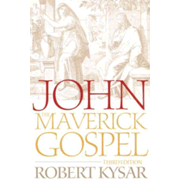 |
John, the Maverick Gospel, Third Edition By Robert Kysar |
The Old King and the New…
Historically we know that after
freedom from Egypt was provided by God and the yet-to-be nation’s desert
wanderings of Israel were past, the nation was sent to drive out the perverted
powers of Canaan. As the scriptures revealed, however, the call to drive out
the pagans was not fulfilled. Instead, the nation of Israel itself became polluted. As
the servant nation of that day, the Hebrews did not fully exercise the divine and holy
will. Intermarriage of Judaism and pagan beliefs prostituted the faith of the nation. And so
too we find the same environment exists with the Church today.
Therefore, we of the Church today are called to particularly note Jesus’ mode of entry into the city. Rather than being mounted on a great horse such as occurred when Caesar crossed the Rubicon, Jesus entered the city of Jerusalem riding a lowly donkey. He rode a poor man’s beast of burden. In this ancient tradition, John and the other writers found Truth.
Therefore, we of the Church today are called to particularly note Jesus’ mode of entry into the city. Rather than being mounted on a great horse such as occurred when Caesar crossed the Rubicon, Jesus entered the city of Jerusalem riding a lowly donkey. He rode a poor man’s beast of burden. In this ancient tradition, John and the other writers found Truth.
You see, the scriptures here contrast
the power exerted by conflict and war, set over against the power of God exercised in lowly servitude. Rather than climbing the steps of a Presidential jet or waving from a guarded motorcade, Jesus was held up before us during the Procession of the Palms to be an example,
as the true Messiah… a Servant King!
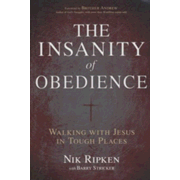 |
The Insanity of Obedience: Walking with Jesus in Tough Places By Nik Ripken with Barry Stricker |
Consider this… our Lord washed the disciple's feet... teaching us also to be servants. He fed us his body and blood so that we can live forgiven and strive to feed the Word of salvation to others. The centrality within the gospel is thus not in procession as a victory parade, but the inability of his followers to see that the fulfillment of his mission involved his death upon the cross.
John portrayed for the emerging and
growing church of the first century, that Jesus had consistently pointed the
way forward even as he rode into Jerusalem. The Church was subsequently revealed by the
Holy Spirit to be called to rise up as servants to others in future history. We
are now to rise up in spite of, and possibly because of… death, oppression and evil powers
working within the world.
For we who follow our Lord today, in naming that we are Christians.... continue the work that our Servant King had finished upon the cross. We, the Church, through the power of the Spirit given in Holy Baptism... become the body of Christ.
This call to action was the recognition missed during that famous procession. In keeping with the confusion of the day the followers of Jesus at first did not understand his true salvation message. His purpose was not to save Jewish nationalism, nor the temple. Those that followed Jesus faithfully saw that after the crucifixion and Resurrection, both the human and divine nature of the Servant King became known to them. Then, at Pentecost the Holy Spirit clearly taught them just what our Lord’s being the “King of kings” really meant. This, I consider to be John’s central message. Jesus came that those who would believe in him might be saved. He alone is our Redeemer!
For we who follow our Lord today, in naming that we are Christians.... continue the work that our Servant King had finished upon the cross. We, the Church, through the power of the Spirit given in Holy Baptism... become the body of Christ.
This call to action was the recognition missed during that famous procession. In keeping with the confusion of the day the followers of Jesus at first did not understand his true salvation message. His purpose was not to save Jewish nationalism, nor the temple. Those that followed Jesus faithfully saw that after the crucifixion and Resurrection, both the human and divine nature of the Servant King became known to them. Then, at Pentecost the Holy Spirit clearly taught them just what our Lord’s being the “King of kings” really meant. This, I consider to be John’s central message. Jesus came that those who would believe in him might be saved. He alone is our Redeemer!
 |
Christus Victor: An Historical Study of the Three Main Types of the Idea of Atonement By Gustaf Aulen, A. G. Herber |
So it is with the Church in today’s world. We
find principalities and powers in the world yet fight for power and control.
And like the Pharisees, they lament that the gospel proclamation cannot be
quenched nor destroyed, try as they might. As we hear of troubles and terror caused
by power-hungry forces that prowl lands around the globe, those who attempt to
stamp out the lives of Christian martyrs shall find that they perform a futile
task. Jesus eternally remains King of kings! The flow of history rests in the hands of our
Creator. Jesus is our Deliver. He has saved us from the powers of death and evil. Thus we hear
in this cry a flow that exists far beyond even our own understanding.
Brother and sisters in Christ, this Good News comes
to us written from across the centuries. Thus we join the cry… “Hosanna, Hosanna…
blessed is He who comes in the name of the Lord!” By the power of the Holy Spirit given to the Church, we have faith which is to be active in love. This is what the “Procession
of the Palms” reveals.
Declare the good news of God’s redemption of us through Christ Jesus, our Lord. We who now gather in the confusion of a modern age, may in the tradition of the ancients… yet lay the meager branches of our lives freely before him. This is indeed the faith of the people of God.
Declare the good news of God’s redemption of us through Christ Jesus, our Lord. We who now gather in the confusion of a modern age, may in the tradition of the ancients… yet lay the meager branches of our lives freely before him. This is indeed the faith of the people of God.
Please be invited to view our short video series dealing with the book of Genesis. These are available on YouTube...
Consider Creation vs Evolution?



